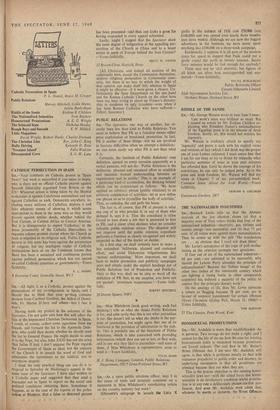PUBLIC RELATIONS
SIR.—The Spectator, one way or another, has re- cently been less than kind to Public Relations. You seem to believe that PR as a function means either press exploitation or breakneck promotion. In fact, PR is neither of these things—but we are involved in Socratic difficulties when we attempt a definition: we can more easily say what PR is not than what it is.
Certainly, the Institute of Public Relations' own
definition, quoted on every occasion apparently as a verbal panacea, will not do : 'Public Relations is the deliberate, planned and sustained effort to establish and maintain mutual understanding between an organisation and its public;' This is an example of a particular kind of nominalism, the thinking behind which can be summarised as follows: 'We have applied an arbitrary phrase [public relations] to an arbitrary conjunction of activities—let us now define our phrase so as to crystallise the body of activities.' Thus, ex cathedra, the cart pulls the horse.
The fact is, of course, that PR at present is what any one of us who practise it, or any of those who demand it, says it is. Thus the consultant is often forced to turn down a job that is presented to him as PR, and a client often declines what we consider valuable public relations advice. The situation will not improve until the public relations consultant performs a function as clearly recognised and widely respected as that of the doctor or dentist.
As a first step, we shall certainly have to make a
less redundant 'deliberate. planned and sustained effort,' and avoid Dickensian vulgarianisms like 'mutual understanding.' More important, we shall have to tackle promotion and publicity campaigns pure and simple under the explicit headings not of Public Relations but of Promotion and Publicity. Only in this way shall we be able to ward off the definition of PR that, to my surprise, you have not yet quoted: 'prostituee respectueuse.'—Yours faith- fully,
20 Dorset Square, NWI HARVEY MITCHELL










































 Previous page
Previous page